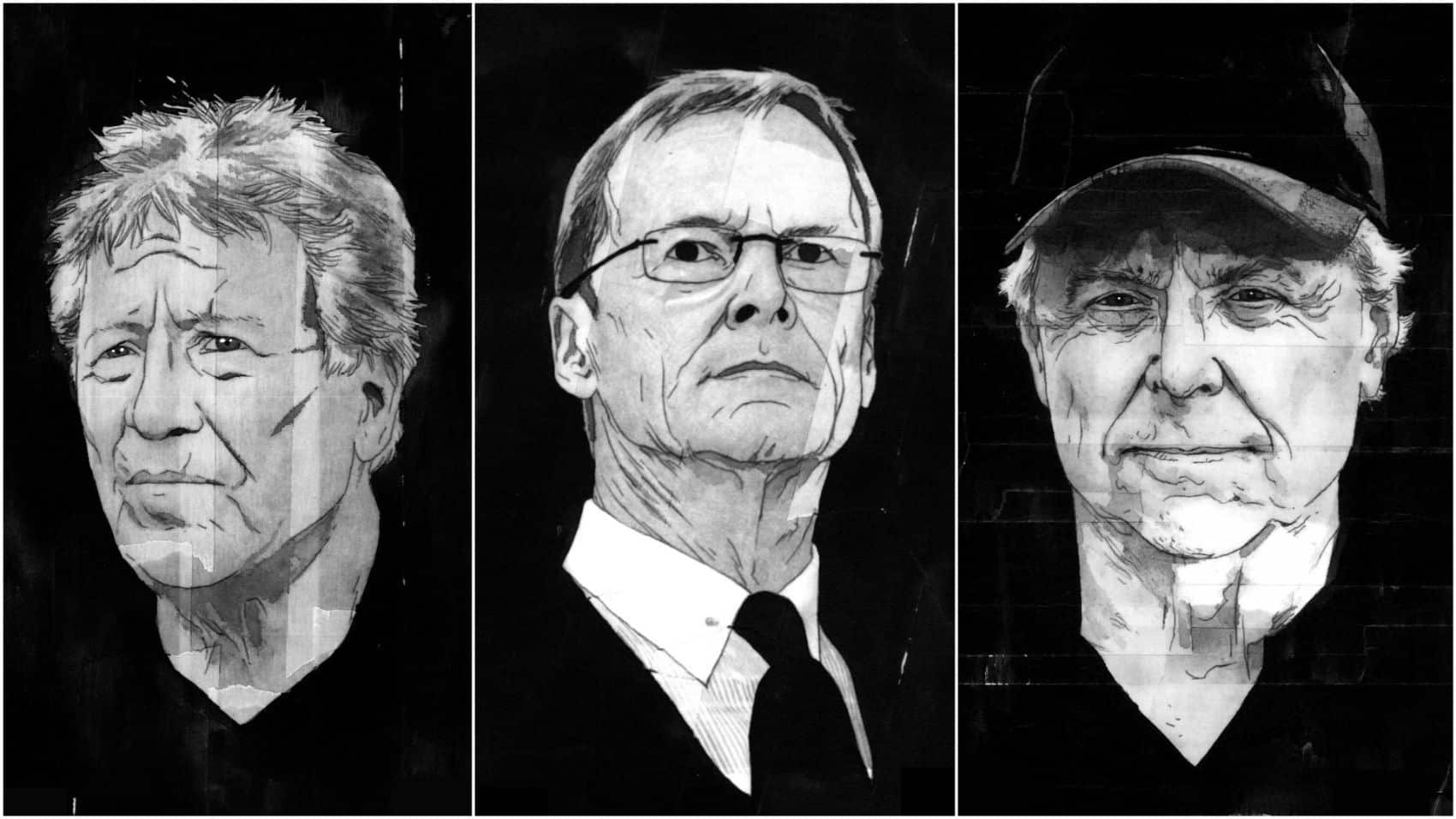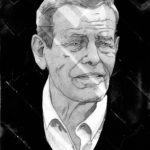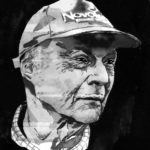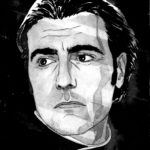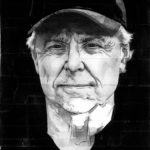- A new book reveals honest insights from Formula 1, Indycar, NASCAR, and Le Mans drivers.
- Sketches by comic book artist Giuseppe ‘Cammo’ Camuncoli capture each driver’s likeness.
- Our Book Garage series showcases what every enthusiast should add to their library.
I had no idea Will Buxton – TV commentator, host, and racing columnist – was working on a book. Even more curiously, it’s a book about a single subject: Losing. Setback. Loss. Defeat. Buxton thought it would be a good idea to sit down with some of the most competitive people on the planet and talk with them about the thing they dislike the most. My Greatest Defeat: Stories of Hardship and Hope from Motor Racing’s Finest Heroes is a surprisingly good book.
As a matter of fact, it is a very good book.
My Greatest Defeat: A Storyteller In Action
I only say surprising because it was written by Will Buxton. Buxton was one of those mildly-irritating F1 pit reporters – he was on the American coverage of F1 a while back – and I always sort of downplayed him. Racing broadcasters are a pet peeve of mine, and although Buxton can occasionally provide insight or reveal a deft observation here and there, I pretty much put him in the camp of “the race would be better if he’d just shut up.”
With My Greatest Defeat Buxton shows himself to be a skillful interviewer. He neither backs away from asking difficult questions nor is he blunt and crass as broadcasting sometimes demands. With this book, it would have been very easy to be trite and banal as the title would suggest. I opened it and said to myself, “let me guess? This is about how I, a young and modern racer overcame all those odds to become a successful young and modern racer.”
I was very wrong about that.
Dangerous Ground At Point-Blank Range
My Greatest Defeat is anything but trite. It is incisive and illuminating about the subject matter at hand. And the subject matter at hand is as highly interesting as it is highly personal. What the book delves into, one racer at a time, is a simple question: “How does it really feel to lose?” This is dangerous ground to tread.
First off, it’s very close to that predictable “what was it like out there?” territory from TV broadcasts of old. Secondly, racers are generally a taciturn bunch. They don’t talk much. And when they do, it’s not about their feelings or what it’s like to lose or crash or almost die. What this book really gets down to is the deeply personal and emotional territory that most people don’t like talking about and exceedingly competitive people like racers are loathe to talk about: Failing.
- Related: This book will make you a walking Formula 1 scholar.
A Gentle Approach
Buxton handles this with a rather typical British wit and charm but also a sensitivity and empathy for who he’s dealing with and what he’s asking. At times he almost comes off like a therapist; wide-eyed, innocent, and willfully oblivious to how loaded some of these questions are.
Not only does he handle the subject very well, but who he covers it with is just as interesting. I was expecting a few old timers, a few championship names, but mainly a bunch of new kids whose “greatest defeat” was coming in third and having to admit it on Instagram. The list, 20 drivers in all, range from old hands like Emerson Fittipaldi and Bobby Unser to guys like Jimmy Johnson and Sebastien Loeb. There were two interviews that particularly caught my attention.
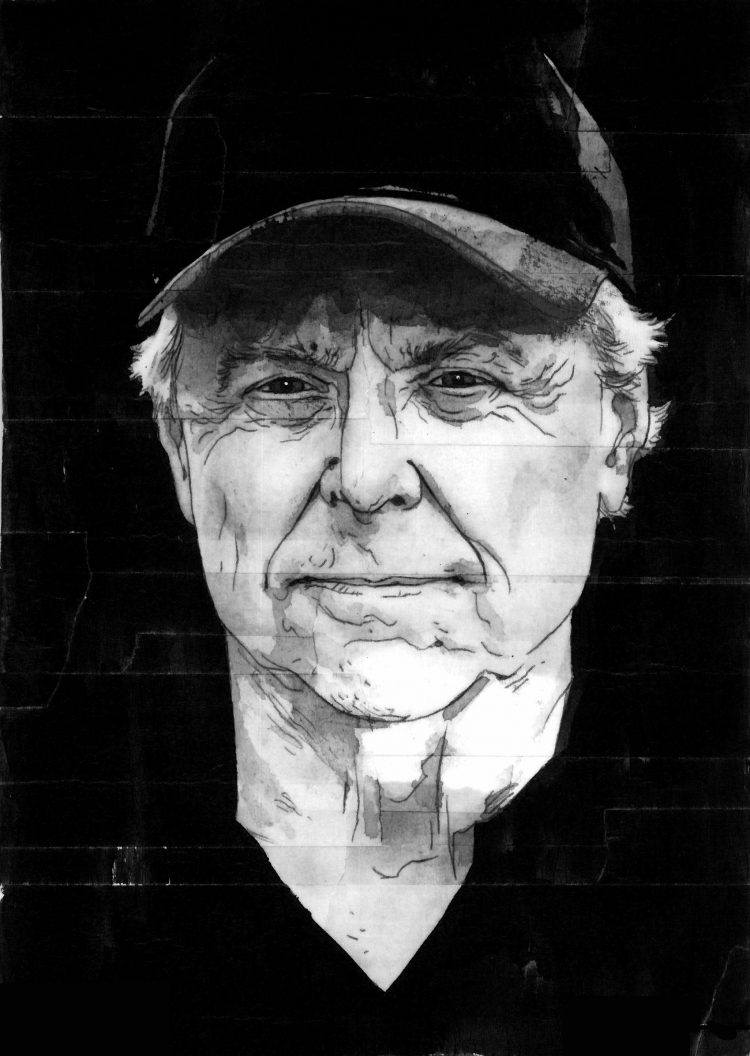
Straight Shootin’ Son of a Gun
The first was Rick Mears. This is not surprising if you know what Mears has gone through. After winning the Indy 500, Mears was in an appalling accident that nearly tore both feet clean off. After multiple surgeries and enough plates and screws and pins to make his x-rays look like photo-plates of an Erector Set, Mears went on to win The Indy 500 three more times. And he relates all this to Buxton in his typical Rick Mears fashion. Plain, direct, clearly spoken, and right to the point.
Mears has always been one of the scariest drivers I have ever encountered for just this reason. He doesn’t brag. He doesn’t get angry or whine. Mears just drives. Fast. And if you ask him a question, he’ll answer it in this odd, disarmingly direct way.
We are used to public figures, especially race car drivers, reading from well-rehearsed internal scripts designed to tick off boxes without ever saying much. Rick Mears is the exact opposite of that. For someone who existed in a world this cutthroat and lower-case-political, he’s one of the most guileless people I have ever known. I’ve seen grocery store clerks behave more guarded than Rick Mears. Did you know Mears is an alcoholic? I didn’t but turns out he is. He’s a 12-stepper, and when Buxton asked him about it, Mears said, “well, what happened was . . . ” and then flatly answered the question. No embarrassment or equivocating. No “yeah, buts” and changing the subject. Just a straight, truthful answer.
This is why I’ve always liked Mears.

Mind Over Matter
The other racer with an amazing interview is Ari Vatanen. Vatanen was a rally racer during the staggeringly dangerous Group B era. While competing in Argentina, he suffered an accident of biblical proportions. His list of injuries read like something titled, “pick any one of the following ways to die!” Multiple bad things happened to Vatanen, but the worst injuries were to his mind. He was in his hospital bed, slowly coming back from near death when he realized his body was healing, but his mind was not. Vatanen became profoundly paranoid and deeply suspicious of literally everyone around him, including his wife and children.
The paranoia gave way to an overwhelming depression and near-complete emotional breakdown. He realized he needed to “talk with someone,” so he started a long road to emotional recovery with his physical rehabilitation. You know how, when someone undergoes a physical mishap, it can take months or years of therapy to repair the damage? The mind and the psyche are the same way. The deeper the injury, the longer and more intense the therapy and recovery will be. Vatanen found himself working with his therapist several times a week for over a year. Slowly, as his body was healed, so was his mind.
“That is how your mind is. But your mind, your mental state, is like a line drawn in the water,” Vatanen says in My Greatest Defeat. “Who is well, and who is unwell.”
A Truly Great Work
My Greatest Defeat is that kind of book. It is as rare as it is insightful. It opens a window into the inner workings of a group of people most of us do not fully understand and does so in a very engaging and fascinating way. I wouldn’t say this book is recommended reading. I say this is required reading.
My Greatest Defeat by Will Buxton
- Hardcover: 336 pages
- Publisher: Evro Publishing Limited (July 30, 2019)
- Language: English
- ISBN-10: 1910505404
- ISBN-13: 978-1910505403
- Product Dimensions: 6.5 x 1 x 9.5 inches
- Shipping Weight: 1.6 lbs.
Where to buy it: Check price on Amazon.
A motor racing broadcaster, commentator, and journalist Will Buxton has had the rare pleasure of turning his great passion into something resembling work for the better part of 20 years. His career has taken him around the world countless times to report on everything from Formula 1 to World Rally to Indycar. While the happy mistake of falling into television as a Formula 1 pitlane reporter in the United States for the SPEED channel and later NBC, followed by his current role as the first Digital Presenter in F1 history, has made him one of the most recognized faces and voices in the sport, his first love was and remains writing. Will lives in Oxfordshire, UK. My Greatest Defeat is his first book.
Sketches by Artist Giuseppe Camuncoli From My Greatest Defeat
Tony Borroz has spent his entire life racing antique and sports cars. He is the author of Bricks & Bones: The Endearing Legacy and Nitty-Gritty Phenomenon of The Indy 500, available in paperback or Kindle format. Follow his work on Twitter: @TonyBorroz.

